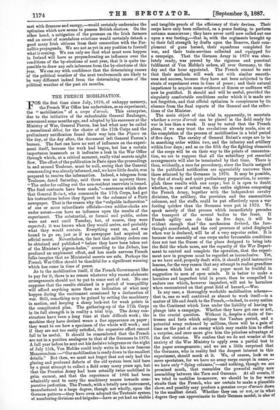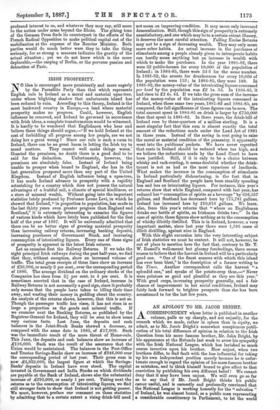THE FRENCH MOBILISATION.
FOR the first time since July, 1870, of unhappy memory, the French War Offioe has undertaken, as an experiment, the "mobilisation" of a corps d'armie. This enterprise, due to the initiative of the redoubtable General Boulanger, announced some months ago, and adopted by his successor at the Ministry of War, General Ferron, has had what may be called a sensational ddbut, for the choice of the 17th Corps and the preliminary notification found their way into the Figaro en the day, or the day after, the document left General Ferron's bureau. The fact can have no sort of influence on the experi- ment itself, because the work had begun, but has a certain importance inasmuch as it indicates a leak in the War Office through which, at a critical moment, really vital secrets might flow. The effect of the publication in Paris upon the proceedings in and around Toulouse, must be null, seeing that the General commanding was already informed, and, we have little doubt, was prepared to receive the information. Indeed, a telegram from Toulouse, dated Saturday, said there was no mystery there. "The order for calling out the non-resident reservists is issued. The food contracts have been made,"—sentences which show that General Buirot, who commands the 17th Corps, had got his instructions before they figured in the columns of a Paris newspaper. That is the reason why the "culpable indiscretion" of one or more subordinate officials—two soldier-clerks are under arrest—can have no influence upon the menhir of the experiment. The substantial, or formal and public, orders were not sent until Tuesday, but, of course, they were expected; it was known when they would arrive, and probably what they would contain. Everything went on, and was bound to go on, just as if no newspaper had acquired an official secret. Nevertheless, the fact that military orders can be obtained and published "before they have been taken out of the Minister's pigeon-holes," according to the Ddbats, has produced an unpleasant effect, and has made nervous French folks imagine that no Ministerial secrets are safe. Perhaps the French War Office should be thankful for a significant warning which has come in time of peace. As to the mobilisation itself, if the French Government like to pay for it, there is no reason whatever why recent elaborate arrangements should not be put to some sort of test. No one supposes that the results obtained in a period of tranquillity will afford anything more than an indication of what may happen during the excitement occasioned by a declaration of war. Still, something may be gained by Betting the machinery in motion, and keeping a sharp look-out for weak points in the complicated plan. The gathering-up of the 17th Corps in its full strength is in reality a trial trip. The Army con- structors have been a long time at their difficult work ; the machine they have devised wears a fine appearance on paper ; they want to see how a specimen of the whole will work ; and if they are not too easily satisfied, the expensive effort cannot fail to be useful. It should be remembered that the French are not in a position analagous to that of the Germane in 1870. A full year before he sent out his decisive telegrams on the night of July 15th, Von Moltke could truly write in his now famous Memorandum :—"Ommobilieation is ready down to the smallest details." But then, we must not forget that not only had the glaring and profound defects of the old system been laid bare by a great attempt to collect a field army many years ago, but that the Prussian Army had been actually twice mobilised in grim earnest, and that the experience of 1866 had been admirably used to carry the machinery nearer towards com- parative perfection. The French, with a totally new instrument, manufactured in a large degree, though not wholly, upon the German pattern—they have even adopted the Teutonic system of numbering divisions and brigades—have as yet had no visible
and tangible proofs of the efficiency of their devices. Their corps have only been collected, on a peace footing, to perform autumn manceuvres ; they have never until now called out one upon a war footing,—that is, with the regiments brought up to their full strength by drafts upon the Reserve, their com- plement of guns horsed, their squadrons completed for war, and their train-services collected and equipped for campaign. That the German Army in 1870 was abso- lutely ready, was proved by the rigorous and punctual fulfilment of Von Moltke's orders, all over Germany, to the day and the hour appointed. The French cannot be sure that their methods will work out with similar smooth- ness and success, because they have not been subjected to the strain of experiment even in time of peace ; and their natural impatience to acquire some evidence of fitness or unfitness will now be gratified. It should and will be useful, provided the singularly comfortable conditions under which it is made are not forgotten, and that official optimism is conspicuous by its absence from the final reports of the General and the reflec- tions of the Minister.
The main object of the trial is, apparently, to ascertain whether a corps d'amie can be placed in the field ready for war in less than a week. It may be noted that the French plans, if we may trust the revelations already made, aim at the completion of the process of mobilisation in a brief period of five days. The cavalry of General Bract's corps are to be in marching order within two, and the infantry and artillery within four days ; and as on the fifth day the fighting elements of the corps will be on their way to the points of concentra- tion, we are to suppose that all the subsidiary yet essential arrangements will also be terminated by that time. There is thus, evidently, a race for precedency, since the limits assigned in the published notification are appreciably narrower than those attained by the Germans in 1870. It may be possible, by dint of steady and quiet preliminary preparation, to accom- plish these results with one corps ; but it is open to doubt whether, in case of actual war, the entire eighteen composing the French Army, together with the independent cavalry divisions, the artillery, the provision and the ammunition columns, and the staffs, could be put effectively upon a war footing quicker than the Germans were put in 1870. We speak merely of that process which immediately precedes
the transport of the several bodies to the front. If French agility can do this in five days, it will be evident enough that' the mechanism devised, the fore- thought manifested, and the cool presence of mind displayed when war is declared, will be of a very superior order. It is because the miserably of one corps under favourable conditions does not test the fitness of the plans designed to bring into the field the whole mass, nor the capacity of the War Depart- ment to control and complete the operation, that the experi- ment now in progress must be regarded as inconclusive. Yet, as we have said, properly dealt with, it should yield instructive lessons, for the very reason that any attempt to realise grandiose schemes which look so well on paper must be fruitful in suggestion to men of open minds. It is better to make a harmless and imperfect trial in peace, than be compelled to endure one which, however imperfect, will not be harmless when encountered on that great field of hazard,—War.
In any case, a thoroughly workable mobilisation scheme— that is, one so well contrived as almost to work itself—is a matter of life and death to the French,—indeed, to every nation on the Continent which lives under the liability of having to plunge into a campaign. Whether they have got one or not, is the crucial question. Without it, despite a chain of for- tresses and forts which eclipses the Vauban period, and a potential army reckoned by millions, there will be a gain of time on the part of an enemy which may enable him to effect a surprise, and once more give him the priceless advantage of the first victories. We confess that we do not wonder at the anxiety of the War Ministry to apply even a partial teat to the paper arrangements ; and we are a little surprised that the Germans, who in reality feel the deepest interest in this experiment, should mock at it. We, of course, look on as mere spectators, for we have no army corps except in name,— we have only "flying columns,"—and nothing, though we are promised much, that resembles the powerful entity now assembling between the Tarn and Garonne. At all events, if we tried to mobilise to-morrow, we should be in far worse straits than the French, who are certain to make a plausible show, and possibly may produce a genuine corps d'armie down to the smallest detail. Whether they can or not, or in what degree they can approximate to their German model, is also of
profound interest to us, and whatever they may say, still more to the nation under arms beyond the Rhine. The gibing tone of the German Press finds its counterpart in the efforts of the French Radical Opposition to make political capital out of the mobilisation at the expense of the Bouvier Ministry. Both parties would do much better were they to take the thing seriously, for so strong a measure indicates the gravity of the actual situation ; yet we do not know which is the more deplorable,—the carping of Berlin, or the perverse passion and detraction of Paris.



































 Previous page
Previous page